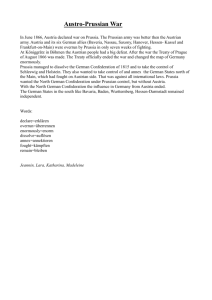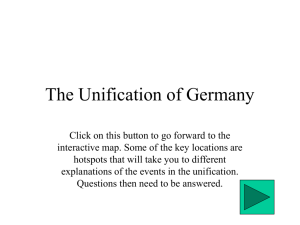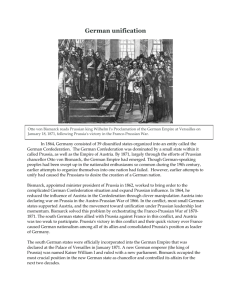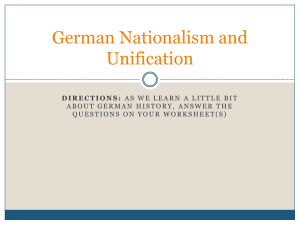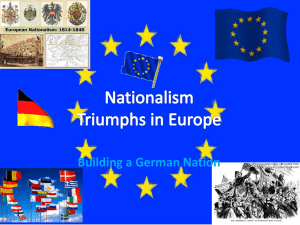Document
advertisement
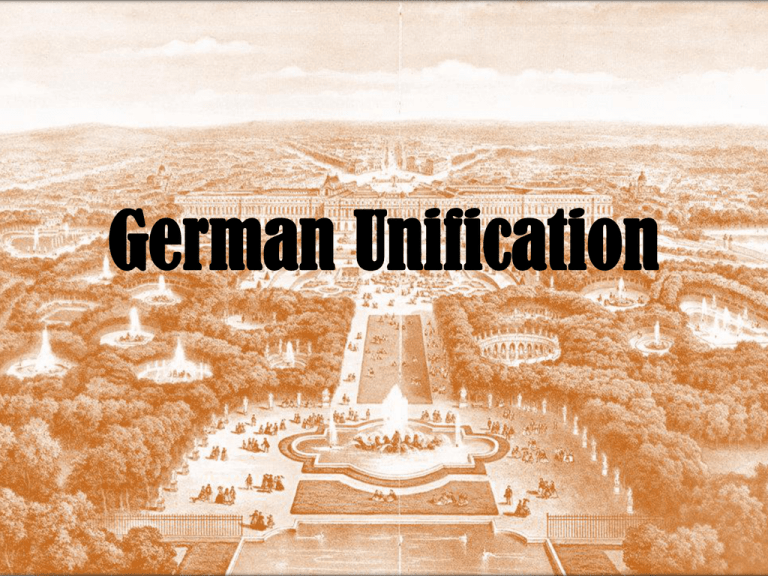
German Unification Step One – Economic Interdependence • A gradual process of economic interdependence from the early stages of the Industrial Revolution through to the mid 19th century saw the Germanic states move towards economic unification. For example, the growth of the railway network in Germany led to easier access to different resources across the confederation. • This helped to stimulate economic growth and meant that economic prosperity was increasingly reliant upon strong links between different member states of the German confederation. This led to the introduction of the Zollverin customs union, an agreement amongst the German states to have preferential customs policies for member states. • This economic union excluded Austria, illustrating a growing German sense of identify and a lesser dependency upon the largest of the Germanic states. Step Two – War with Denmark • Schleswig and Holstein are two German • duchies that were under Danish rule. Holstein's population was largely German speaking and Schleswig's was a mix of Germans and Danes. In the 1840s the Danes attempted to claim Schleswig and Holstein. This resulted in uproar from • German nationalists and demands for the two duchies to be fully incorporated into the German Confederation. In 1848, this led to a brief war for control of the two duchies. The resulting Treaty of London stated that upon the accession to the Danish throne of the Prince, Christian, the duchies would remain under Danish rule but not be incorporated into the nation state of Denmark. Denmark broke the terms of the Treaty of London. This led to an outcry amongst German nationalists. The German Confederation mobilised an army and invaded the duchies. War with Denmark resulted in a victory for the Germanic Confederation and the acquisition of Schleswig and Holstein. Following the victory it was agreed that Austria would manage the duchy of Holstein and that Prussia would be in charge of the day to day running of Schleswig. The two major German powers clashed many times over the manner in which the duchies were to be administered. Historians still debate whether the German chancellor, Bismarck, deliberately set out to provoke Austria. Either way, the result was a political division within the German Confederation with Austria and Prussia now fighting for dominance of the Germanic states. Step Three – War with Austria • Austrian-Prussian War. In 1866 further arguments about the administration of Schleswig-Holstein led to war breaking out between Austria and Prussia. This war lasted seven weeks and resulted in a Prussian victory over the Austrians. In beating the Austrians on the battlefield the Prussians assumed the role of senior Germanic state. This led to a clearer division between Austrian and German interests and forced the smaller states to align themselves alongside the Prussians, with whom they shared more economic ties due to the aforementioned Zollverin customs agreement. Step Four – War with France! • The Franco-Prussian War. Between 1866 and 1870 relations between Prussia and France worsened. In 1870, frustrated by the Prussian attitude to the issue of candidacy for the vacant throne of Spain, France declared war on Prussia. The resulting Prussian victory was both swift and decisive. It resulted in the removal from power of the French Emperor, Napoleon III and led to a wave of Germanic Nationalism sweeping through the whole of the German Confederation. • Following victory over France in January of 1871, Prussia was able to persuade her partners within the German confederation that unification was desirable. As a result, Wilhelm of Prussia was proclaimed Emperor of Germany on January 18th 1871. The Second German Reich was born. The First Treaty of Versailles • The 1871 Treaty of Versailles ended the Franco-Prussian War. • Germany’s victory and capture of the French emperor resulted in the near collapse of the French government. • The Versailles Palace had been used as France’s centre of political power outside of Paris for centuries. • While the French government deteriorated, Bismarck succeeded in achieving German Unification on January 18, 1871 creating the German Empire. King Wilhelm I of Prussia was declared Kaiser of the newly created empire in the Hall of Mirrors in the Versailles Palace. The Final Product • The Second Reich was made up of 25 German states. Each of these retained its own Prince, as each had previously been a Princedom. These states were represented on a National Level by the Reichsrat, the upper house of legislative Parliament. • The Head of State was the Kaiser. This role was an hereditary one based upon the old Kingdom of Prussia. The Kaiser had the right to summon the Reichstag and dismiss it as and when he felt appropriate. He also had the power to appoint and dismiss the Chancellor and all government ministers. It was these Ministers who would propose legislation to the two houses of Parliament. • The Reichstag was the main legislative body. This institution was democratically elected every 3 years, with all men over the age of 25 having the vote. This body debated issues and voted on proposed legislation. The Reichsrat had the power to veto legislation passed by the Reichstag. • Each State within the Reich had its own local legislative body that dealt with local issues. Otto von Bismarck • Otto von Bismarck (1815-1898), born on April 1, 1815 at Schönhausen, is considered the founder of the German Empire. For nearly • three decades he shaped the fortunes of Germany, from 1862 to 1873 as prime minister of Prussia and from 1871 to 1890 as Germany's first Chancellor. • Bismarck engineered wars with France and Austria in order to hasten the process of German unification. An example of this is his use of the Ems Telegram. • Ems telegram, report of an encounter between King William I of Prussia and the French ambassador; the telegram was sent from Ems (Bad Ems) in the Prussian Rhineland on July 13, 1870, to the Prussian chancellor (Bismarck). Bismarck edited the telegram so as to purposely offend the French government precipitated the Franco-Prussian War. Bismarck's greatest achievements included developing a common currency, a central bank, and a single code of commercial and civil law for Germany. • Bismarck also became the first statesman in Europe to devise a social security system to counter offering workers insurance against accident, sickness and old age. • By 1890 his policies began to come under attack. On March 18, 1890 two years after Emperor William II’s accession, Bismarck was forced to resign. His last years were devoted to composing his memoirs.
